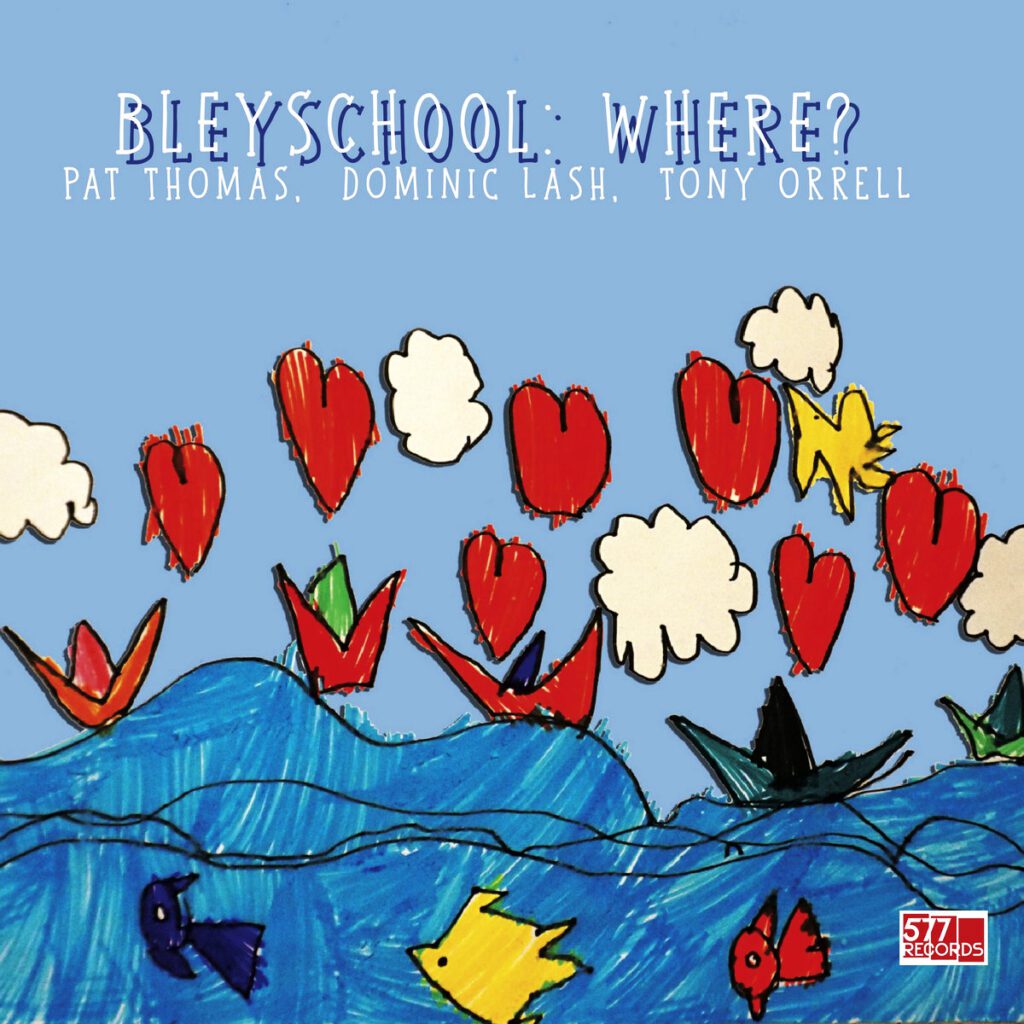Jazz music is flush with tributes, but few are as vigorous as the homage that UK pianist Pat Thomas has paid to the late Paul Bley. It’s a group filled out with double bassist Dominic Lash and drummer-percussionist Tony Orrell, both fellow Brits. The first record in the project, simply titled BleySchool, was released by 577 Records in 2020, with vinyl copies still available. On August 2, its follow-up BleySchool: Where? arrives, also via 577, on compact disc in a limited edition digipak (100 copies) and digital through Bandcamp. The set’s seven pieces beautifully extend Thomas’ celebration of Bley and reinforce that there’s still plenty of gas in the piano trio tank.
It’s important to note that the music on BleySchool: Where? continues to be more than just a tribute to Paul Bley, while never losing focus on the Canadian pianist’s multifaceted artistry. As on the first set, the trio tackles “Ida Lupino,” a composition by Bley’s ex-wife Carla Bley, which was introduced to the record buying public as the opening track on his 1966 album Closer. It was his second of two records for ESP-Disk, a trio date that featured Steve Swallow on bass and Barry Altschul on percussion.
That “Ida Lupino” is heard on both BleySchool releases isn’t a bit unusual. Bley recorded it again on his very next album following Closer, the 1967 BYG Actuel release Ramblin’ with Altschul and bassist Mark Levinson. It’s also doubly appropriate that BleySchool dig into “Ida Lupino” on a Bley homage, as the song was itself a tribute to the great actress and trailblazing film director.
Bley’s playing of “Ida Lupino” on those albums is gorgeous and concise, staying true to the melody, the first version clocking in at 2:55 and the second 3:30. For Thomas, Lash, and Orrell the piece is a launching pad for improvisation and a source of expansion, deconstruction and rebuilding, rather than a mere copy (imitation flatters, but is ultimately shallow).
The “Ida Lupino” on the first BleySchool album (recorded in 2018) clocks in at just over 12 minutes and the take on Where? (from 2022) breaks 16; both are considerably abstract in nature with clear similarities to the European free improv tradition, especially early on. Thomas emerges gradually and does engage with the melody, but it’s more like putty in his hands.
There are even more Carla Bley compositions on Where? as the focus of Thomas and his crew largely lingers on the early Paul Bley trio recordings. There’s a boisterous reading of “King Korn” from the 1962 Savoy LP Footloose! with Swallow and drummer Pete LaRoca, and from the same record, “Syndrome,” which is the second half of a medley excursion that’s fronted by Annette Peacock’s composition “Gesture Without Plot.”
It can’t be a coincidence that these two pieces are heard back to back (but in reverse order) on the 1973 album Paul Bley & Scorpio, a trio session released by Milestone featuring bassist Dave Holland and Altschul, just as the two standards that are included on Where?, “All the Things You Are,” which opens Where?, was part of Bley’s book.
Bley cut “All the Things You Are” while backing Sonny Rollins and Coleman Hawkins (and later in trios), and although it doesn’t appear that he ever recorded “There Is No Greater Love,” the chances that he didn’t know the tune (a composition long associated with Duke Ellington, composed by Isham Jones and Marty Symes) are slim. Thomas obviously knows both songs well enough that he can take them apart, reassemble and reinvigorate them, the group steering far wide of the typical piano trio model.
The closest Where? gets to piano trio mode is late in the record, with a version of “Monk’s Mood,” thunderous, angular and energetically paced, that’s still recognizably Monk-ian. Bley included “Monk’s Mood” as the only non-original on his 2001 solo piano set Basics. For BleySchool: Where?, the group takes the opposite approach; the closing title piece is the only original, credited to the trio, a real key banger that retains its compositional fortitude. If Thomas, Lash, and Orrell dished a Bley-inspired disc every four years until the world stopped spinning, that’d be just fine.
GRADED ON A CURVE:
A
